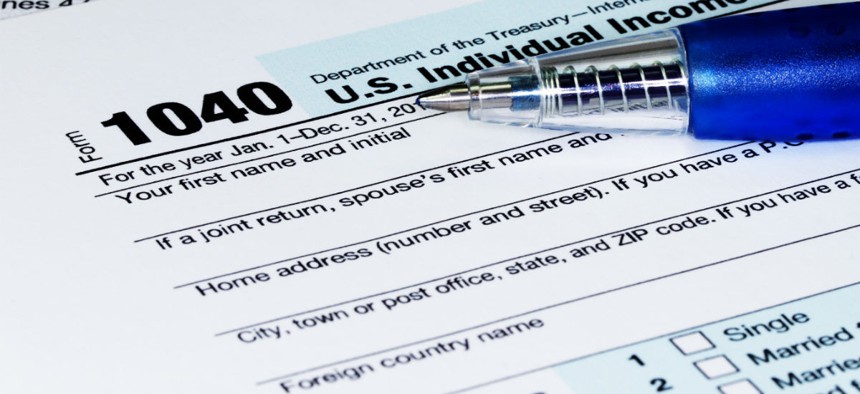
Eastside Cindy / Shutterstock.com
There Were 8.8M Calls the IRS Didn’t Even Try to Answer in 2015
Taxpayer advocate documents deteriorating customer service, suggests the IRS rethink its priorities.
The 2015 tax filing season went really well for taxpayers -- so long as they had no questions about their returns or were able to hire help. That was one conclusion of a mid-year report to Congress released Wednesday by National Taxpayer Advocate Nina Olson.
Given its significant budgetary constraints, the Internal Revenue Service “did a good job overall” during the last filing season, Olson said. Still, “millions of taxpayers were unable to reach the IRS by phone; millions did not receive a timely response (if any) to their correspondence; and many more may have had to pay a tax preparer or professional for answers to tax law questions or for assistance they could previously have obtained from the IRS for free,” the report stated.
In one example of declining customer service that Olson also cited earlier this year at the Urban-Brookings Tax Policy Center, the IRS answered just 37 percent of calls routed to its telephone assistors during the 2015 filing season, and the average wait time was 23 minutes. That compares to answering 71 percent of calls last year, when hold times were 14 minutes.
There were also 8.8 million cases in which the IRS did not even try to answer the phone in 2015, compared to 544,000 so-called “courtesy disconnects” in 2014. Disconnects happen when the agency’s switchboard is overloaded.
“There is no doubt that the deficiencies in taxpayer service are substantially attributable to a lack of resources,” Olson said in the preface to the report.
The agency’s funding has decreased 17 percent since fiscal 2010, when adjusted for inflation, the taxpayer advocate noted. Further stretching resources, the IRS had to implement challenging portions of two laws -- the Affordable Care Act and the Foreign Account Tax Compliance Act – without any additional funding, the report said. This made “sharp declines” in taxpayer service “inevitable,” Olson concluded.
Olson argued for more funding, but also said that the IRS should prioritize its current spending levels differently. The agency is focused too heavily on enforcement for the 2 percent of taxpayers who are delinquent in their obligations, and not enough on serving the 98 percent who are trying to pay the correct amount on time.
“There is a real risk that the inability of taxpayers to obtain assistance from the government, and their consequent frustration, will lead to less voluntary compliance and more enforced compliance,” the report stated.
Another problem, Olson said, is the agency’s emphasis on automating services. “The IRS’ vision of the future rests on a mistaken assumption that it can save dollars and maintain voluntary compliance by automating taxpayer service and issue resolution and getting out of the business of dealing with taxpayers directly in person or by phone,” Olson said.
Taxpayers need to be able to talk to IRS employees to convey their unique circumstances, the report said. “IRS should want to talk with these taxpayers, because each conversation provides an opportunity for it to understand the taxpayer’s facts and circumstances, recognize a situation that presents a different issue, educate the taxpayer about what is required for full compliance and provide full resolution to the taxpayer’s problem.”
The National Treasury Employees Union blamed the IRS’ problems squarely on Congress, calling the customer service declines documented in Olson’s report shocking.
“It is disgraceful that Congress has allowed the level of service to taxpayers to fall so low,” NTEU President Colleen Kelley said in a statement. “These dramatic declines are a direct result of severe cuts to the IRS budget.”
Sen. Chuck Grassley, R-Iowa, also lamented IRS’ poor service record, but used the report as an opportunity to advocate legislation he introduced in June to “hold the IRS accountable to the public.” Grassley’s Taxpayer Bill of Rights Enhancement Act (S. 1578) would increase penalties on IRS employees for unauthorized disclosure of private taxpayer information and crack down on the use of private email for official business. The bill also permits the Treasury Department to provide status updates, and in certain instances requires status updates, regarding investigations into misconduct by IRS employees or certain third parties. It is similar to parts of a bill the House passed in April.
“Clearly, the IRS needs to dial up better service to taxpayers, rather than hanging up on those who have questions filing their returns,” Grassley said in a statement. “The IRS commissioner this spring predicted an ‘abysmal’ level of customer service during this tax filing season, and by that measure, it appears the agency beat those low expectations by a country mile.”
Charles S. Clark contributed to this report.







